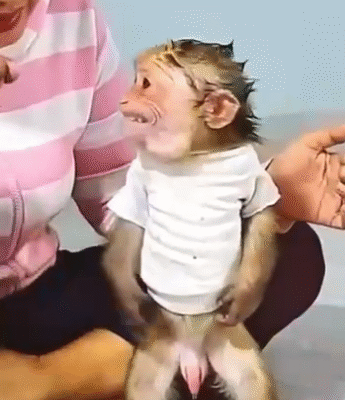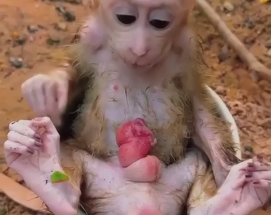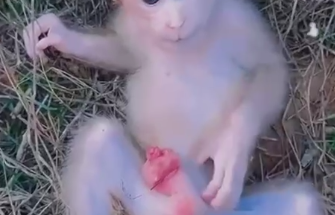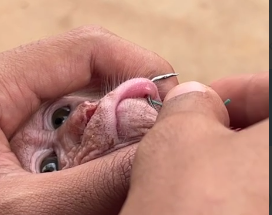It was a quiet afternoon when a call came into the local wildlife rescue center. A villager had spotted something unusual on a dirt path near the edge of the forest — a tiny creature lying motionless in the dust, barely breathing. When the rescue team arrived, their hearts sank.
There, curled up in a ball of dirt and dried leaves, was a newborn baby monkey — alone, weak, and clearly in distress. His tiny body was no bigger than a human hand, his eyes still closed, and his soft fur was matted with dirt. He trembled in the light breeze, crying out with soft, pitiful squeaks that barely carried in the wind.
The rescuers quickly scanned the area. No mother in sight. No troop. No signs of adult monkeys nearby. They searched the trees and undergrowth, hoping the mother was close — perhaps foraging or watching from a distance. But after an hour of searching, it became clear: the baby had been abandoned, or worse, his mother had died.
One of the rescuers gently scooped him up. He was cold and dangerously dehydrated. Every breath he took was a battle. His umbilical cord was still attached — he had likely been born within the last 24 hours. How he had survived alone for that long was a miracle in itself.
They named him Nino, which means “little boy” in Spanish — a fitting name for someone so small, so vulnerable.
The First Hours
Back at the center, Nino was placed inside a warm incubator. His temperature was dangerously low, and his heartbeat was faint. A volunteer stayed by his side, watching his tiny chest rise and fall, praying that he would hold on.
Feeding him was a delicate task. He was too weak to suckle from a bottle, so they used a tiny syringe to drip formula into his mouth — drop by drop. At first, it seemed like he might not make it. His eyes stayed closed, and he barely moved. But slowly, something changed.
By the second day, Nino began to show signs of life. His grip tightened when someone offered him a finger. His cries grew a little louder. His ears twitched at sounds. He began to respond to warmth and touch, clinging to a small stuffed monkey placed inside his incubator for comfort.
A Baby Without a Mother
In the wild, baby monkeys depend on their mothers for everything — food, warmth, protection, and emotional support. They cling to their mother’s belly day and night, listening to her heartbeat, learning from her every move. Without her, a baby monkey stands little chance.
This made Nino’s survival even more remarkable.
To mimic the feeling of his mother, the caretakers carried him against their chest inside a warm cloth pouch. He was never left alone. He needed to feel someone’s heartbeat, to hear soothing whispers, to know he was safe. Volunteers worked in shifts, taking turns to feed, carry, and comfort him around the clock.
It was exhausting work — but no one complained. Nino’s life was worth every sleepless night.
Learning to Live
Weeks passed. Nino grew stronger. His eyes finally opened, revealing large, dark eyes full of curiosity and fear. He clung tighter to his caregivers, following their every movement with a gaze that seemed to ask, “Where is my mother?”
He started to move more — crawling, climbing, testing his legs. His tiny hands grabbed ropes and branches set up in his enclosure. A favorite toy was a hanging plush ball, which he batted at with growing confidence.
By the third month, Nino had made an incredible transformation. He was healthy, active, and playful. Still, he had moments of sadness — times when he’d cry suddenly, for no clear reason, seeking the comfort of someone’s arms. It was a painful reminder that no matter how well he was cared for, nothing could replace a mother’s love.
A Second Chance
The rescue center eventually introduced Nino to another orphaned baby monkey, a slightly older female named Tala. Their bond was instant. Tala groomed Nino, and he followed her everywhere, just like he would’ve followed his mother in the wild.
Together, they began to learn the skills they would need to survive one day in the forest: climbing, foraging, hiding, socializing. Under the watchful eyes of the center’s team, they formed their own little “troop,” helping each other heal from their pasts.
Nino wasn’t alone anymore.
Hope for the Future
Nino’s story is a painful reminder of how fragile life in the wild can be — and how many baby animals lose their parents to habitat destruction, hunting, or human interference. But it’s also a story of hope. With compassion and care, even the smallest, most pitiful creature can be given a second chance.
Today, Nino is still in the rescue center, growing stronger each day. One day, when he and Tala are old enough and ready, they will be released into a protected forest area, where they can live wild and free — as they were always meant to.
But for now, Nino is safe. He has food, warmth, and a new family. And though he began his life cold and alone in the dirt, he now has something he didn’t have before: a future.



